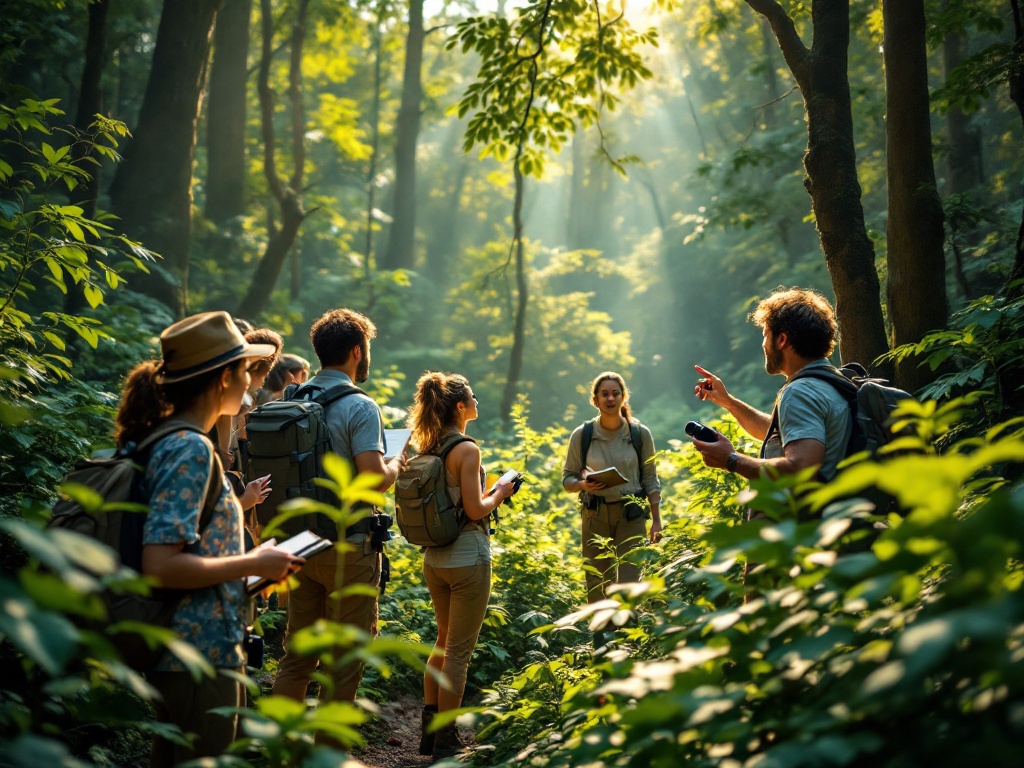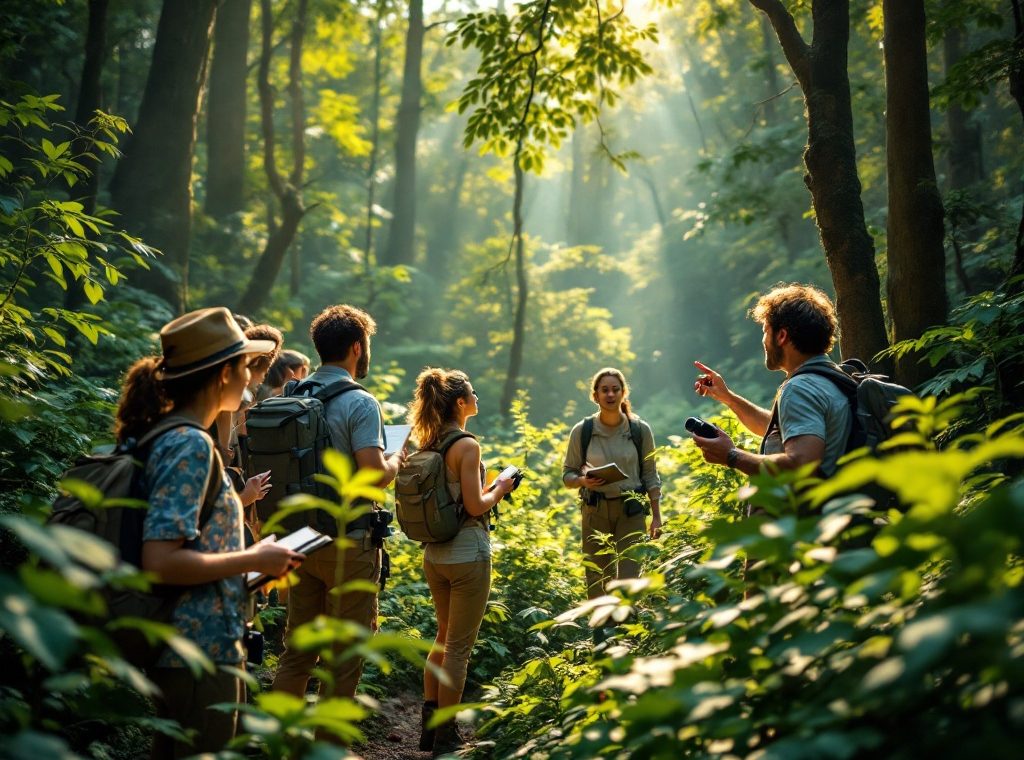Eco-Tourism Meets Science: How to Combine Nature and Learning
Discover the transformative power of eco-tourism! Explore pristine natural areas while supporting conservation and local communities. Learn about environmental issues through hands-on experiences like guided nature walks and wildlife monitoring. Become an advocate for sustainable travel and make a real difference. Dive in to learn more about eco-tourism’s positive impact on the planet.
Important information

- Eco-tourism promotes responsible travel to natural areas, conserving the environment, protecting wildlife, and sustaining local communities.
- It offers educational opportunities, raising awareness about environmental issues through interactive tours, workshops, and hands-on activities like wildlife observation and participation in conservation projects.
- Travelers can engage in participatory science, contributing to research projects like biodiversity studies and monitoring animal populations.
- Eco-tourism supports conservation efforts by generating funds for research, habitat restoration, and promoting sustainable practices in local communities.
- It combats climate change by encouraging nature-based tourism that minimizes environmental impact and educates travelers about the effects of climate change on ecosystems.
What is Eco-Tourism? Combining Nature and Learning
Eco-tourism promotes responsible travel to natural areas, conserving the environment and protecting wildlife. It also sustains local communities by considering the environmental, economic, and social impact of tourism. Furthermore, eco-tourism educates travelers about environmental issues, raising awareness and offering a transformative experience that combines nature with learning.
Environmental Education as a Learning Tool
Ecotourism and environmental education are intertwined. Education fosters conservation awareness and promotes responsible travel. Reciprocally, ecotourism immerses travelers in educational adventures, allowing them to explore ecosystems, encounter wildlife, and grasp conservation principles. Interactive tours, workshops, and activities further enhance their understanding of environmental issues.Hands-on learning through ecotourism solidifies ecological concepts. Guided nature walks and wildlife observation provide invaluable insights. Participating in conservation projects offers a deeper understanding of habitat preservation and environmental science.
Benefits of Ecotourism Education
Empowered by knowledge, travelers gain a greater appreciation for ecosystems and conservation. Learning scientific principles transforms them into advocates for sustainable practices, contributing to the protection of natural resources.
- Guided nature walks,
- Wildlife viewing,
- Workshops on sustainability,
- Expert-led discussions.
Resources for Eco-conscious Travelers
Travelers benefit from a range of resources to enhance their understanding of the ecosystems they visit. These resources cover conservation efforts, local cultures, and the importance of biodiversity.
- Guided tours,
- Workshops,
- Educational materials.
Learning in the Field
Ecotourism offers a wealth of learning opportunities, from field studies in biodiversity and wildlife tracking to workshops on sustainable practices and community engagement.
Interactive Experiences
Activities like bird watching and coral reef monitoring provide hands-on learning.
Expert Insights
Expert-led tours and lectures offer deeper insights into local ecosystems.
Making a Difference
Volunteering for conservation projects provides enriching experiences and allows travelers to make a tangible difference.
Using Eco-Tourism for a Transformative Learning Experience
Ecotourism transforms our understanding of nature by connecting us directly with the environment. Travelers learn about conservation and sustainable practices, fostering personal growth and raising environmental awareness.
Examples of ecotourism activities:
- participating in field studies exploring biodiversity,
- attending sustainability workshops,
- embarking on guided tours led by experts,
- volunteering for conservation projects.
Educational opportunities in ecotourism:
- guided nature walks,
- discussions with scientists,
- immersive experiences teaching about habitat preservation,
- activities that increase awareness of environmental issues.
The Role of Participatory Science in Eco-Tourism
Participatory science engages travelers in real-world research, enhancing the educational value of ecotourism. Conducted in natural environments, these projects boost data collection and conservation efforts. Eco-tourists collaborate with researchers on projects such as:
- biodiversity studies,
- monitoring animal populations,
- tracking migration patterns, and
- assessing ecosystem health.
This teamwork proves invaluable.
Research Collaboration: Engaging Eco-Tourists in Biodiversity Studies
Eco-tourists play a vital role in biodiversity research by participating in citizen science projects, collecting crucial wildlife data. For example, they might monitor animal populations. The Earthwatch Institute, a leading organization in this field, relies on volunteers for essential long-term studies, such as research on humpback whales. Other organizations provide similar opportunities for eco-tourists to actively contribute to scientific discovery, fostering a rewarding connection between research and travel.
Community and Visitor Engagement in Eco-Tourism
Eco-tourism offers a powerful way to travel responsibly and protect our planet. It benefits the environment by supporting important causes through responsible travel. It generates funds for conservation, safeguarding animals and their habitats. Travelers contribute significantly by choosing eco-friendly businesses, minimizing waste, and supporting local projects. These communities play a vital role, sharing their environmental and cultural knowledge, fostering respect between visitors and locals. Activities like guided nature walks educate travelers about the natural world. Volunteering for conservation projects promotes sustainability and raises environmental awareness. Eco-tourism creates a positive impact on the environment and local communities.
Benefits for the Environment
- Generates funds for conservation efforts, protecting animals and their habitats.
- Supports eco-friendly businesses and sustainable practices.
- Minimizes waste and pollution through responsible travel choices.
- Promotes environmental awareness through educational activities.
Benefits for Local Communities
- Provides economic opportunities through tourism.
- Shares environmental and cultural knowledge with visitors.
- Fosters respect and understanding between locals and travelers.
- Empowers communities to participate in conservation efforts.
Visitor Engagement: How Eco-Tourism Supports Environmental Causes
Ecotourism offers travelers a unique way to support environmental causes while learning about local issues and the importance of conservation. It generates crucial funding for vital projects, including research and habitat restoration. Travelers can actively participate through guided nature walks, wildlife monitoring, and volunteer work. Moreover, ecotourism promotes responsible travel by supporting local communities dedicated to sustainability, ultimately protecting the environment for future generations. Here’s how ecotourism benefits the environment and local communities:
Environmental Benefits
- Supports conservation efforts.
- Funds research and habitat restoration.
- Promotes responsible travel.
- Protects the environment for future generations.
Community Benefits
- Supports local communities.
- Provides economic opportunities.
- Encourages sustainable practices.
- Promotes cultural exchange and understanding.
Eco-Tourism and Ecosystems: A Focus on Marine Conservation
Eco-tourism plays a vital role in ocean conservation by educating visitors about marine ecosystems and promoting responsible travel. This approach supports conservation efforts by boosting funding and engaging local communities. Nature-based tourism combats climate change by encouraging sustainable practices and safeguarding marine environments.
Addressing Climate Change Through Nature-Based Tourism
Nature-based tourism minimizes environmental impact through sustainable practices, educating travelers about climate change’s effects on ecosystems. Witnessing rising sea levels or shifting weather patterns firsthand can be a powerful motivator, inspiring action and support for climate mitigation projects. These initiatives protect vulnerable areas, offering a responsible way to experience nature while combating climate change.














